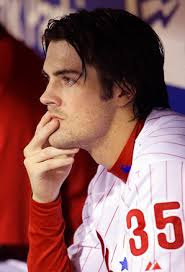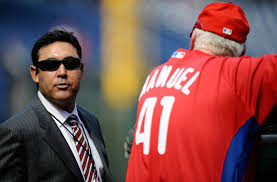 |
| Roy "Doc" Halladay |
Yesterday the Phillies received news that ace right-handed pitcher Roy Halladay will occupy the disabled list for 6-8 weeks. Phillies pitching coach Rich Dubee removed Halladay from his most recent start after only 2 innings claiming, "I know he's had a cranky shoulder and he hasn't looked right, and didn't look right today." Prior to Sunday, Halladay had looked a bit off. His fastball velocity has been lower than usual, down from 94mph to 91mph, and his other numbers have seemed subpar for a pitcher consistently in the running for the Cy Young award. The news of his shoulder strain should come as little surprise to fans who have diligently followed Doc's season. No matter how predictable, Halladay's trip to the disabled list comes at a time in which the Phillies find themselves in last place in the NL east. The team continues have numerous offensive woes, partially due to the absences of Chase Utley and Ryan Howard, and partially due to the lack of solid offensive threats throughout their current lineup.
The 2012 Phillies have the
second highest payroll in Major League Baseball at $173,953,939. In 2008,
the year the team won the World Series, the Phillies payroll was $98,269,880. In 4 seasons the
team has added $75,684,059 in payroll and 0 world series titles.
Admittedly, the team has made the playoffs each of the last 4 seasons, but with no more rings to show for the added expenditures. In addition to adding significantly to the payroll, the Phillies have traded away many of their top prospects in order to acquire veteran players. Phillies General Manager Ruben Amaro traded Travis D'arnaud and Kyle Drabek for Roy Halladay, Anthony Gose and Jonathan Villar for Roy Oswalt, and Jared Cosart and Jonathan Singleton for Hunter Pence. All three trades contributed to the depletion of the farm system, to the point at which Baseball Prospectus writer Kevin Goldstein describes it as "An unbalanced, shallow system bolstered by some big arms, both in terms of size and velocity." So, in conclusion, the Phillies mortgaged the future in order to win now. Thus, if the team concludes that the team will not make the playoffs this season, the only logical decision is to trade away certain older parts in order to regain a lower payroll and better farm system.
The question is, if the team decides to turn the 2012 season into a fire sale, who do they trade and who do they keep? Veterans Jimmy Rollins, Placido Polanco, Chase Utley, Ryan Howard, and Jonathan Papelbon are most likely untradable with their current contracts, ages, health, and production, while catcher Carlos Ruiz would not garner a great return despite putting up All-star numbers this season. Tradeable players include Shane Victorino, Cliff Lee, Roy Halladay, Hunter Pence, and Cole Hamels. Of these select few, the Phillies might have most trouble getting good value in return for Halladay and Lee because of Halladay's age and recent arm troubles and Lee's large contract. Even without the possibility of trading Halladay and Lee, a number of other players might give the Phillies a chance to replenish an ugly looking farm system.
Hunter Pence, for whom the Phillies traded in 2011, has underperformed this season, but still remains extremely valuable. He provides above average fielding in right field with solid hitting. Pence has compiled at least a 3.2 WAR every season he has played, while making 3 All-star teams. At 29 years old Pence has one more year of arbitration and then becomes a free agent in 2014. He is a perfect candidate for a trade except that the Phillies may not receive as much for him as they gave away to Houston.
Shane Victorino is a versatile outfielder who plays hard, can hit in multiple spots in the order, provides speed and some power, while playing outstanding defense. Victorino's lone blemishes include his contract, which expires at the end of this season, and his age, 31. A team needing to add some speed and experience to their outfield would love to add a player like Victorino. Like Pence, Victorino may not garner a great bounty, but I would not be surprised to see a team trade 2 B level prospects or 1 A level prospect for the veteran (the Twins did trade Wilson Ramos for Matt Capps....Matt Capps).
 |
| Will Hamels wear Phillies red in 2013? |
The golden goose is Cole Hamels. Hamels is young, 28, and extremely talented, 8-1 with a 2.43 ERA, 2.93 FIP, 1.01 WHIP, and 9.29 K/9. Above all else, he has post-season experience (see 2008 NLCS and World Series MVP awards) and he has been improving his pitching acumen by adding the cutter and curveball to his repertoire. Hamels lone problem is his contract situation. Hamels current deal expires at the end of this season and he will most likely command a huge amount of money this off-season. This situation might scare off some potential suitors who are unwilling to trade the type of prospects needed to land Hamels in order to have him pitch for only half a season. Nonetheless, the Phillies could demand and receive a team's best hitting and pitching prospects for Hamels.
 |
| Ruben Amaro Jr. next to Phillies Manager Charlie Manuel |
While I do not foresee the Phillies trading Victorino, Pence, or Hamels, the best decision may be to abandon ship and sell the cargo for as much gold as possible. Ruben Amaro has never been the General Manager during hard times, as he took over for Pat Gillick after the 2008 season. Although he may not want to admit defeat, especially after putting so much effort into compiling the 2012 squad, becoming sellers as the trade deadline nears may become the most optimum choice for the future of the Phillies ball club. Most analysts agree that Amaro has built the Phillies to win now, and not to win in the future. There is a reason why winners of the lottery decide to be paid their winnings over a long period of time as opposed to all at once, people like consistency. It was Joseph who foretold Pharaoh of 7 plentiful years followed by 7 lean year, but is was also Joseph who advised the Egyptian king to store food from the first 7 years in order to feed the country during the next 7. This story illustrates the need for consistency. Fans want to watch a winning team, and unless the Phillies make some moves, their future may be riddled with losses. This is the time in which we find out if Ruben Amaro has true greatness as a General Manager because leaders need to know when to go all-in just as much as they must understand when to walk away and cash out.